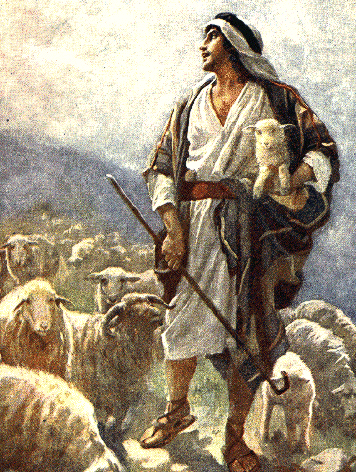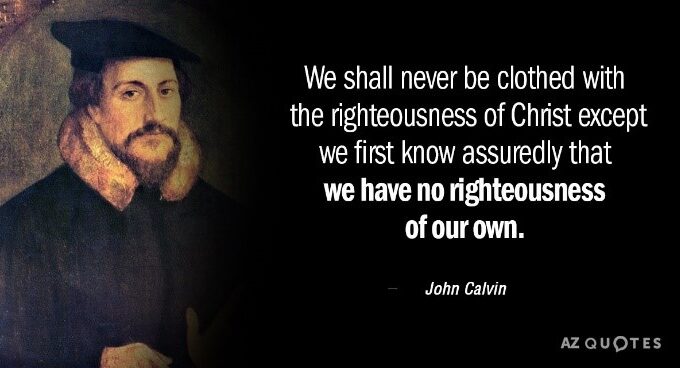God is righteous. He is good and he is holy. He created a moral universe. But we are neither good nor righteous. Sin is found in the heart of every man and woman.
We live in a moral universe. Atheists want license to live as they please without guilt. So they deny God and reject the concept of a moral universe.
 The trouble is, we are all sinners and fall short of the glory of God. We may deny our own sin, but we inadvertently acknowledge the morality of our universe by our pointing out the moral failures of others. C.S. Lewis made the profound observation: “Those who do not think about their own sins make up for it by thinking incessantly about the sins of others.”
The trouble is, we are all sinners and fall short of the glory of God. We may deny our own sin, but we inadvertently acknowledge the morality of our universe by our pointing out the moral failures of others. C.S. Lewis made the profound observation: “Those who do not think about their own sins make up for it by thinking incessantly about the sins of others.”
Luther’s dilemma
The great reformer Martin Luther had a major dilemma: he knew he was a sinner naked before a righteous God.
Luther was man of strong moral conscience who could not deny his sin. How could he, or any human, live before the face of a righteous God? One could  never do enough good works to overcome the weight of one’s sin. If we took our sin seriously, we would spend much of the day in confession and repentance. The God of heaven and earth is holy; next to him my righteous acts are as filthy rags (Isaiah 64:6).
never do enough good works to overcome the weight of one’s sin. If we took our sin seriously, we would spend much of the day in confession and repentance. The God of heaven and earth is holy; next to him my righteous acts are as filthy rags (Isaiah 64:6).
When Isaiah saw the holiness of God he immediately understood how sinful he was.
In the year that King Uzziah died I saw the Lord sitting upon a throne, high and lifted up; and the train of his robe filled the temple. Above him stood the seraphim. Each had six wings: with two he covered his face, and with two he covered his feet, and with two he flew. And one called to another and said:
“Holy, holy, holy is the Lord of hosts;
the whole earth is full of his glory!”
And the foundations of the thresholds shook at the voice of him who called, and the house was filled with smoke. And I said: “Woe is me! For I am lost; for I am a man of unclean lips, and I dwell in the midst of a people of unclean lips; for my eyes have seen the King, the Lord of hosts!”
The insight that changed Luther forever
Luther could relate to Isaiah’s horror. In fact Luther hated the righteousness of God, because he realized his sin would not allow him to approach a righteous God. But as Luther studied the scriptures he saw an insight that changed his life forever, and changed the course of history as well.
 In the Black Cloister of the monastery in Wittenberg, Luther read Paul’s letter to the Romans speaking of “the righteousness of God.” God’s righteousness had always brought terror to his heart. Luther knew himself to be a sinner under the judgment of a righteous God. Then he read Romans 1:17: “For in the gospel a righteousness from God is revealed, a righteousness that is by faith from first to last, just as it is written: ‘The righteous will live by faith.’”
In the Black Cloister of the monastery in Wittenberg, Luther read Paul’s letter to the Romans speaking of “the righteousness of God.” God’s righteousness had always brought terror to his heart. Luther knew himself to be a sinner under the judgment of a righteous God. Then he read Romans 1:17: “For in the gospel a righteousness from God is revealed, a righteousness that is by faith from first to last, just as it is written: ‘The righteous will live by faith.’”
Theologian R.C. Sproul, preaching from Romans 1, relates Luther’s aha moment.
And so Luther said, “Whoa, you mean the righteousness by which I will be saved, is not mine?” It’s what he called a justitia alienum, an alien righteousness; a righteousness that belongs properly to somebody else. It’s a righteousness that is extra nos, outside of us. Namely, the righteousness of Christ. And Luther said, “When I discovered that, I was born again of the Holy Ghost. And the doors of paradise swung open, and I walked through.”
Christ’s righteousness made available to us!
Righteousness is not achieved by good works. The good news that righteousness is from God is revealed and received through faith. From Romans 1:7, Luther came to 3:21-24:
But now a righteousness from God, apart from law, has been made known, to which the Law and the Prophets testify. This righteousness from God comes through faith in Jesus Christ to all who believe. There is no difference, for all have sinned and fall short of the glory of God, and are justified freely by his grace through the redemption that came by Christ Jesus.
 The righteousness of God is not gained by our efforts, but by Christ’s work on the cross. We receive the righteousness of God through faith in the finished work of Jesus Christ.
The righteousness of God is not gained by our efforts, but by Christ’s work on the cross. We receive the righteousness of God through faith in the finished work of Jesus Christ.
The words leaped off the page to Luther’s heart. Their power brought the collapse of a mental stronghold–salvation by works—and replaced it with the truth of salvation by faith. Luther came to understand that attempting salvation by the works of the law brings bondage. But salvation by grace through the finished work of Christ leads to freedom. That freedom, beginning in the heart, brought release and transformation to Paul, whose apostlic ministry brought the same to Luther. In turn, the preaching of Luther and other reformers brought freedom to nation after nation.
Indeed, God can use one life to alter the course of history. Read in Luther’s own words, the story of the change that God brought in his life in his study in the Black Cloister of the Monastery in Wittenberg.
Paul’s dilemma
Paul’s dilemma was Luther’s problem and, in fact, it is every man’s dilemma. Paul describes his personal struggle in Romans 7:21-25:
So I find it to be a law that when I want to do right, evil lies close at hand. For I delight in the law of God, in my inner being, but I see in my members another law waging war against the law of my mind and making me captive to the law of sin that dwells in my members. Wretched man that I am! Who will deliver me from this body of death? Thanks be to God through Jesus Christ our Lord! So then, I myself serve the law of God with my mind, but with my flesh I serve the law of sin.
 Yes we all are wretched. But there is a way of deliverance. It is grounded in the finished work of Christ, His life, death and resurrection, appropriated by faith. In his second letter to the Corinthians Paul states it succinctly: “For our sake he made him to be sin who knew no sin, so that in him we might become the righteousness of God,” 2Cor. 5:21.
Yes we all are wretched. But there is a way of deliverance. It is grounded in the finished work of Christ, His life, death and resurrection, appropriated by faith. In his second letter to the Corinthians Paul states it succinctly: “For our sake he made him to be sin who knew no sin, so that in him we might become the righteousness of God,” 2Cor. 5:21.
We have said in these pages before, it is at the cross where love and justice meet. Here mercy and punishment reside. What took place when Christ went to the cross was a great exchange. Theologians have used the word imputation to describe this miracle.
Imputation
“Imputation” is used in theological circles, but derived from an accounting term. The word comes from the Latin imputare “to reckon, make account of, charge, ascribe.” It means to reckon, to ascribe something to an account.
Paul speaks of a double imputation. First, Christ was made sin for us (carried our debt) and second, His righteousness was accredited to my account.
The first transaction was that my sin, my debt, was placed on Christ’s account and nailed to the tree with him. Paul captures this in his letter to the Colossians.
And you, who were dead in your trespasses and the uncircumcision of your flesh, God made alive together with him, having forgiven us all our trespasses, by canceling the record of debt that stood against us with its legal demands. This he set aside, nailing it to the cross. Col. 2:13-14
Justified
Just-as-if-I’d never sinned
The second transaction was that His righteousness, His credit, was placed in my account. This imputation is the first stage of our salvation: justification! This word literally means JUST-AS-IF-I’d–NEVER SINNED. When God looked at Christ on the cross, what did he see? He saw a sinner. He saw you and me. Now if you are in Christ, when God looks at you, what does he see? The righteousness of God.
An ancient revelation
Long before Luther received the revelation through Paul, even before Paul received his understanding of the righteousness of God becoming our righteousness, something of this truth was articulated by the psalmist David and the prophet Jeremiah.
 David, perhaps in reflections one night while watching his sheep, wrote the following Psalm 4:1:
David, perhaps in reflections one night while watching his sheep, wrote the following Psalm 4:1:
Answer me when I call, O God of my righteousness!
You have given me relief when I was in distress.
Be gracious to me and hear my prayer!
David understood that God is not only a righteous God, He is the source of David’s righteousness.
Similarly, the prophet Jeremiah proclaimed in Jeremiah 23:5-6:
“Behold, the days are coming,” says the Lord,
“That I will raise to David a Branch of righteousness;
A King shall reign and prosper,
And execute judgment and righteousness in the earth.
In His days Judah will be saved,
And Israel will dwell safely;
Now this is His name by which He will be called:
THE LORD OUR RIGHTEOUSNESS.
Is God holy and righteous? Most certainly! Are we sinners to the very core of our being? Certainly! But there is a way for the unrighteous to stand before the face of God. How is that? By being clothed in the righteousness.
- Darrow Miller






